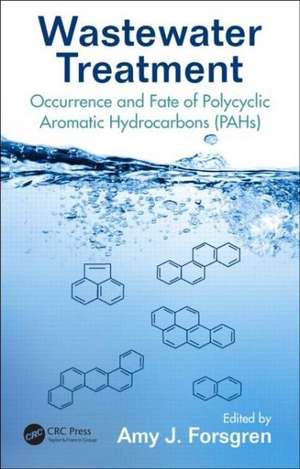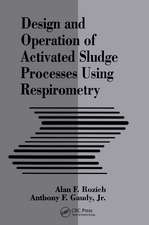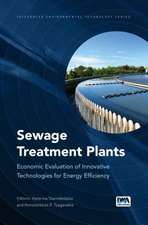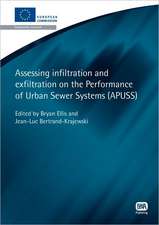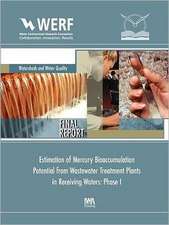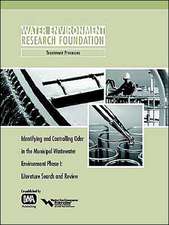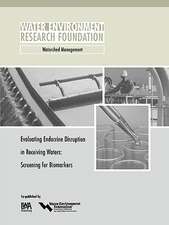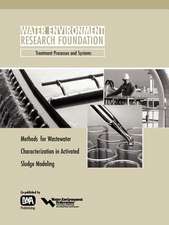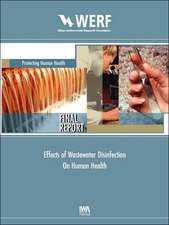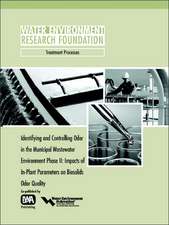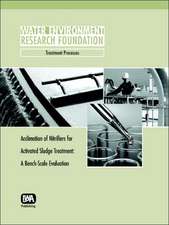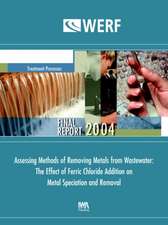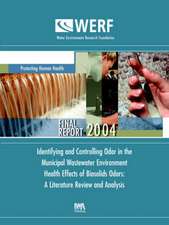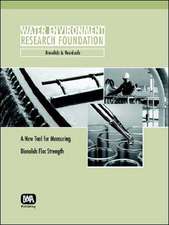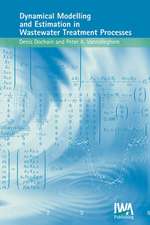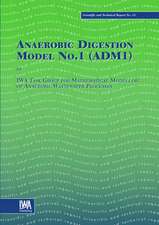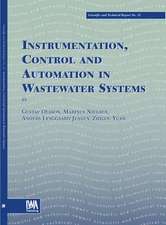Wastewater Treatment: Occurrence and Fate of Polycyclic Aromatic Hydrocarbons (PAHs): Advances in Water and Wastewater Transport and Treatment
Editat de Amy J. Forsgrenen Limba Engleză Hardback – 21 apr 2015
Preț: 659.61 lei
Preț vechi: 776.01 lei
-15% Nou
Puncte Express: 989
Preț estimativ în valută:
126.24€ • 131.13$ • 104.86£
126.24€ • 131.13$ • 104.86£
Carte tipărită la comandă
Livrare economică 03-17 februarie 25
Preluare comenzi: 021 569.72.76
Specificații
ISBN-13: 9781482243178
ISBN-10: 1482243172
Pagini: 260
Ilustrații: 22 black & white illustrations, 54 black & white tables
Dimensiuni: 156 x 234 x 20 mm
Greutate: 0.54 kg
Ediția:1
Editura: CRC Press
Colecția CRC Press
Seria Advances in Water and Wastewater Transport and Treatment
ISBN-10: 1482243172
Pagini: 260
Ilustrații: 22 black & white illustrations, 54 black & white tables
Dimensiuni: 156 x 234 x 20 mm
Greutate: 0.54 kg
Ediția:1
Editura: CRC Press
Colecția CRC Press
Seria Advances in Water and Wastewater Transport and Treatment
Cuprins
Introduction. PAHs in natural waters: natural and anthropogenic sources, and environmental behavior. Quantitative changes of PAHs in water and in wastewater during treatment processes. Occurrence of PAHs in water resources in Tunisia. Occurrence, removal and fate of polycyclic aromatic hydrocarbons and volatile organic compounds in municipal conventional activated sludge processes and membrane bioreactors. PAHs in wastewater and removal efficiency in conventional wastewater treatment plants. Advanced oxidation potential of PAHs in the environment and engineered systems. PAH treatment in wastewater treatment facilities during wet and dry weather.
Recenzii
"…a timely publication of relevant technologies to detect, quantify, and treat PAHs in various environmental matrices including water, wastewater, sewage, sludge, soil and sediment. Written by academic and industrial international experts, the book covers a wide spectrum providing in-depth analysis using up-to-date references, pilot and full-scale studies, relevant for academic researchers as well as practicing engineers."
—Madhumita B Ray, Professor, Department of Chemical and Biochemical Engineering, Western University, Ontario, Canada
"Wastewater treatment plants are considered as a point of convergence of a huge diversity of organic contaminants present at low to very low levels but that may affect our ecosystem when treated wastewaters and sludge are discharged into the environment; PAHs are ones of concerns. Their presence in natural waters, wastewaters, sludge, soils and sediments, their fate and removal during conventional and advanced wastewater treatments, their environmental behavior are of particular interest for engineers, scientists, policy makers, and are depicted in this book which gives an updated overview on these relevant topics."
—Dominique Patureau, INRA, Laboratoire de Biotechnologie de l’Environnement, Narbonne, France
—Madhumita B Ray, Professor, Department of Chemical and Biochemical Engineering, Western University, Ontario, Canada
"Wastewater treatment plants are considered as a point of convergence of a huge diversity of organic contaminants present at low to very low levels but that may affect our ecosystem when treated wastewaters and sludge are discharged into the environment; PAHs are ones of concerns. Their presence in natural waters, wastewaters, sludge, soils and sediments, their fate and removal during conventional and advanced wastewater treatments, their environmental behavior are of particular interest for engineers, scientists, policy makers, and are depicted in this book which gives an updated overview on these relevant topics."
—Dominique Patureau, INRA, Laboratoire de Biotechnologie de l’Environnement, Narbonne, France
Descriere
This book describes the sources of water contamination by PAHs and their transportation and fate in natural aquatic systems. It then discusses, from the analytical chemist’s view, how to determine the presence of PAHs in water and wastewater, and the changes in PAH concentration during treatment processes. The text examines the removal of PAHs using membrane bioreactors and advanced sludge processes, highlighting results from both demonstration and full-scale plants. It also examines the presence of PAHs in conventional wastewater treatment plants, especially in sludge.
